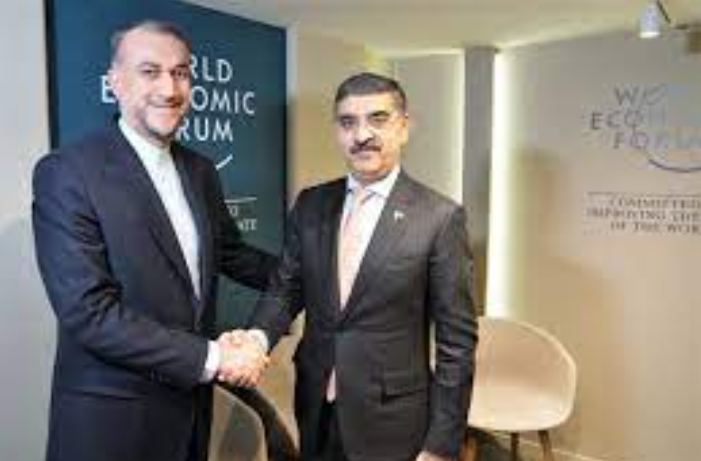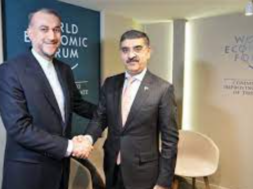
Roving Periscope: Despite China brokering peace, Pakistan wary of Iran
Virendra Pandit
New Delhi: With China playing the peacemaker between two frenemies, the Pakistan-Iran tension after their tit-for-tat airstrikes against each other has blown over for now but Islamabad is still wary of Tehran’s next possible move.
Both Shia Tehran and Sunni Islamabad are close allies of Beijing. And Pakistan is heading towards the crucial parliamentary polls on February 8.
China was worried about the possible re-entry of America into the region to shift the focus of war from Gaza and the fate of its incomplete China-Pakistan Economic Corridor (CPEC) when Iran on Tuesday this week launched a missile attack in Pakistan’s restive Baluchistan province as the USD 62 billion project passes through this restive province bordering Iran. Hours later, Pakistan also retaliated with a missile attack on Iran.
On Thursday, Beijing offered its role to de-escalate tensions between Pakistan and Iran, after the two neighbors launched airstrikes against “terrorists” in each other’s territory.
“Iran and Pakistan are close neighbors and friendly countries to China, holding significant influence,” Foreign Ministry spokeswoman Mao Ning said, adding “China is willing to play a constructive role in de-escalating the situation if it is deemed necessary.”
When asked about Pakistan’s airstrikes inside Iran, Mao said: “We don’t have any information on this, but (China) is closely monitoring the situation,” China’s official mouthpiece Global Times quoted her as saying.
Earlier, Pakistan said it carried out a series of “highly coordinated and specifically targeted precision military strikes” against “terrorist hideouts” in Iran’s Sistan-Baluchistan province, killing several terrorists.
According to the Pakistani military, its aircraft and drones flew some 20 km inside Iran to hit the terrorist hideouts.
When Iran’s several pleas failed, it launched attacks in Pakistan targeting what it described as bases for the militant group Jaish al-Adl in the border town of Panjgur in Baluchistan, prompting strong condemnation from Islamabad.
Pakistan also recalled its ambassador to Tehran, suspended high-level visits with Tehran, and blocked the return of the Iranian ambassador to Islamabad.
This week’s exchange of deadly airstrikes on militant targets heightened regional tensions, already strained by the conflict between Israel and Hamas in Gaza.
But, Pakistan and Iran on Friday agreed to de-escalate tensions.
The international community, including the United Nations and the United States, called for restraint, while China played a behind—the—scenes role.
A telephonic conversation between Pakistan’s Foreign Minister Jalil Abbas Jilani, and his Iranian counterpart Hossein Amir-Abdollahian paved the way for the two neighbors to defuse the situation.
A joint statement released by Islamabad’s foreign ministry highlighted their agreement to “de-escalate the situation” and strengthen coordination on counter-terrorism and other mutual concerns.
“The Foreign Minister stressed that respect for territorial integrity and sovereignty must underpin this cooperation,” the Pakistani foreign ministry said.
The Baluchistan region shared between Pakistan and Iran, has long been a hotspot for militant activities.
Pakistan’s caretaker Prime Minister Anwaar-ul-Haq Kakar held an emergency security meeting, cutting short his visit to the World Economic Forum in Davos, Switzerland, as the General Elections to the National Assembly are scheduled to take place on February 8. Kakar had met the Iranian Foreign Minister in Davos just before Tehran’s attack in Baluchistan.
“The forum reiterated the unflinching resolve that sovereignty and territorial integrity of Pakistan are inviolable,” said a statement released by Kakar’s office. “Any attempt by anyone to breach it on any pretext will be responded with (the) full might of the state.”
“The meeting also concluded that in line with the universal principles governing the conduct of good neighborly relations, the two countries would mutually be able to overcome minor irritants through dialogue and diplomacy and pave the way to deepen their historic relations further,” the statement read.
The security meeting stressed that Pakistan and Iran should “address each other’s security concerns in the larger interest of regional peace and stability.”
Following the Iranian attack on Pakistan, India underlined its “zero tolerance” stance towards terrorism, but added it understands “actions that countries take in their self-defense.”
“This is a matter between Iran and Pakistan. Insofar as India is concerned, we have an uncompromising zero tolerance towards terrorism. We understand actions that countries take in their self-defense,” Foreign Ministry spokesperson Randhir Jaiswal told a press briefing.
Condemning Iran’s actions, the US State Department said, “I think it is a little rich… on one hand, Iran (is) the leading funder of terrorism in the region, and, on the other hand, (it claims) it needs to take these actions to counter-terrorism.”













